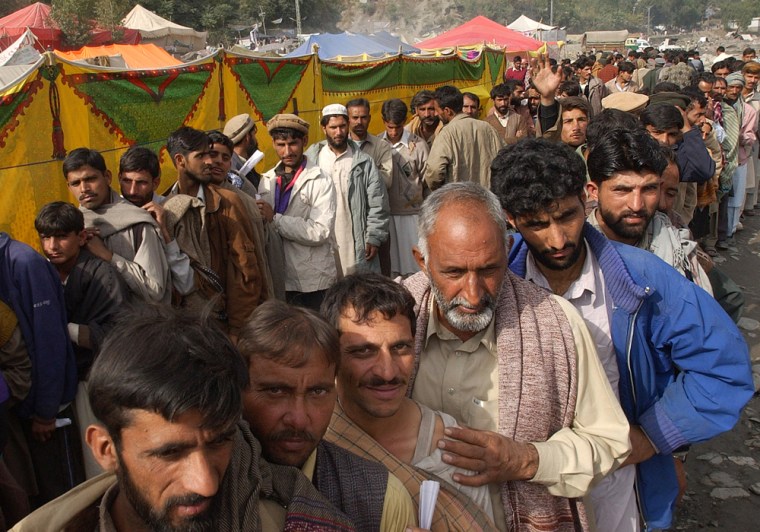Health authorities Saturday launched a two-week campaign to immunize 800,000 children in divided Kashmir to prevent infectious disease from thriving in the crowded and sometimes squalid tent camps for earthquake survivors.
Meanwhile, Pakistan and Indian opened a third crossing through their disputed Kashmir frontier as part of limited cooperation between the nuclear rivals since the Oct. 8 quake. But it involved only a ceremonial swap of aid as with the previous two openings — with no crossings by Kashmiri residents.
Also Saturday, calm returned to a makeshift refugee camp in Muzaffarabad a day after police used bamboo canes and rifle butts to break up a march by survivors protesting eviction from the public park where they had been living.
Pakistani police said they had no immediate plans to move the camp residents.
Vaccination campaign
U.N. and Pakistani health officials spearheading the immunization drive in Pakistan’s portion of Kashmir are racing to protect children before the region’s savage winter strikes, starting in the most remote towns hit by the quake and working their way toward larger hubs.
“Now, the mourning period is over, and everybody is ready to move forward to make sure that those who carry the future will be protected,” said Dr. Edward Hoekstra, a senior health adviser for UNICEF, the U.N. children’s agency. “We are starting in the most inaccessible areas in case the weather turns bad in the next two weeks.”
The campaign aims to vaccinate children up to age 15 against diseases including measles, polio, diphtheria and tetanus. Shots will include vitamin A, which can reduce the mortality rate of respiratory illnesses expected to be rife in winter by up to 50 percent, Hoekstra said.
A similar campaign was begun earlier in Pakistan’s North West Frontier Province — also devastated by the quake. In all, the agencies plan to immunize 1.2 million children in the region.
In the aid transfer at the Pakistan-India border, porters from either side walked across a bridge over the Neelum River, bringing sacks of rice and blankets. Kashmiri villagers squatted on the rocky banks on either side, sometimes waving at each other.
India and Pakistan agreed Oct. 30 to open five crossings along their heavily militarized border and allow Kashmiris to join relatives on the other side. Those plans have been delayed in part because the two sides need to scrutinize lists of travelers.
“I wish I could have crossed over to see my relatives. This does not make sense,” Teethwal resident Abdul Qadeer said on the Indian side. “I have no news of my brother and his children.”
Violence over misunderstanding
Friday’s violence in Muzaffarabad broke out over a misunderstanding when police sought to meet with tent camp residents over plans to move them to facilities with better sanitation. Quake survivors thought they were being given an ultimatum to leave, said Yasin Qureshi, senior superintendent of police in Muzaffarabad.
About 200 people began to march through the city before police blocked their way. About 10 people were arrested.
Qureshi denied there were orders to clear the camp, but public rallies in the city have been banned since Wednesday so that quake relief efforts are not hampered.
Quake survivors have been setting up informal camps all over the city, most of them lacking adequate sanitation and considered to be public health risks.
The quake, centered in divided Kashmir, killed about 86,000 people in Pakistan’s portion of the territory and another 1,350 in India. It destroyed bridges, roads, and the homes of more than 3 million people.
Quake relief, compensation for lost livelihoods and reconstruction costs will total about $5.2 billion, according to a joint report issued Friday by the Asian Development Bank and World Bank.
Cost estimates come amid growing alarm over shortfalls in donations for quake victims. The U.N. says it needs $550 million in emergency aid for quake victims, but donors have pledged only about $131 million.
